|
|
|
Sort Order |
|
|
|
Items / Page
|
|
|
|
|
|
|
| Srl | Item |
| 1 |
ID:
099370
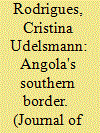

|
|
|
|
|
| Publication |
2010.
|
| Summary/Abstract |
Santa Clara, on Angola's southern border with Namibia, is now a very dynamic urban hub, both economically and socially. It stands out in the remote province of Cunene, recording greater growth in the last five years than the provincial capital, Ondjiva. Its recent transformation into a thriving trading centre was mostly due to massive migration and an intensification of trade between Angola and Namibia at the beginning of this century, although the region's history in the last hundred years is a very different one. While local traders and entrepreneurs have developed their own strategies within this context, national and local administrative structures of the recently pacified country are trying to regulate trading and settlement. These forces in action produce both more sustainable and organised urban growth and at the same time influence social and economic development in the region. The main boom seems to be over, due to relatively successful regulation, which makes the region less attractive to business activity. Traders and entrepreneurs operating locally now have to find new strategies and opportunities. This article, based on empirical research and combined surveys, conducts an analysis of these dynamics and contributes to an understanding of regulation impacts, the way in which local traders cope with them, and the strategies they have developed.
|
|
|
|
|
|
|
|
|
|
|
|
|
|
|
|
| 2 |
ID:
128476
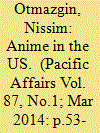

|
|
|
|
|
| Publication |
2014.
|
| Summary/Abstract |
In the past two decades, the enthusiastic global reception of Japanese cultural exports has drawn wide academic attention. In the case of Japanese animation ("anime"), its penetration into the United States, the world's biggest media market, has been described as owing greatly to the crucial role of fans as cultural agents, the deterritorializing effects of globalization, the domestication and heavy editing of anime to suit local tastes, and being part of the wider global flow of Japanese pop culture and "soft power." Drawing on interviews with Japanese and American key personnel in the anime industry, field research and market surveys, this paper focuses on the organizational aspect of the anime market in the United States since the mid-1990s, with particular attention to the role of entrepreneurs, who are imperative for bridging organizational rigidities and cultural differences in global markets. The central argument presented is that entrepreneurship is a central feature in the process of transnational penetration, distribution, reproduction and consumption of cultural commodities and genres, which produce ever more complex and disjunctive economic, cultural and political orders.
|
|
|
|
|
|
|
|
|
|
|
|
|
|
|
|
| 3 |
ID:
150741


|
|
|
|
|
| Summary/Abstract |
Against the background of mounting research suggesting entrepreneurship as a means of increasing the uptake of renewable energy technologies (RETs) in developing countries, this paper presents the findings of an exploratory investigation into the business models used by renewable energy entrepreneurs in such countries. Forty-three entrepreneurs were interviewed in 28 developing countries and secondary information about country and regional conditions was analysed. We chose the Business Model Canvas as an analytical tool and the findings shed new light on established renewable energy business types. Three different types of businesses were identified – Consultants, Distributors, and Integrators; yet, there is also some overlap between these types. These business types appeared to parallel the life cycle progression of the business, but this requires further research. A key component of the study was to assess whether the types of businesses were related to country-level conditions to assess the impact of regional differences. These comparisons revealed consistencies between country-level characteristics and the entrepreneurs’ choice of business model. Conclusions suggest that different regions may support certain business models more than others due to differing levels of government interest in renewables, governance and policy support and the relative ease of doing business.
|
|
|
|
|
|
|
|
|
|
|
|
|
|
|
|
| 4 |
ID:
120113


|
|
|
|
|
| Publication |
2013.
|
| Summary/Abstract |
In this article, we provide an introduction to the Special Issue of the Journal of Conflict Resolution devoted to the impact of violent conflict on entrepreneurship in developing countries. First we note that there is insufficient attention in the literature on the impact of violent conflict on the firm or entrepreneur level. Then, after we define entrepreneurship and violent conflict, we provide a summary of the existing literature and give an overview of the contributions in this Special Issue. We conclude by noting policy implications and areas for further research.
|
|
|
|
|
|
|
|
|
|
|
|
|
|
|
|
| 5 |
ID:
163127
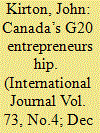

|
|
|
|
|
| Summary/Abstract |
Canada has been the successful entrepreneurial conceiver, co-creator, and normative and policy shaper of the G20 since the start. Under Paul Martin, Canada invented the concept and mission of the G20, co-creating it as a finance ministerial forum in 1999. Under Stephen Harper, Canada supported its elevation to summit in 2008, hosted it in 2010, and led important policy outcomes. Under Justin Trudeau, Canada further fostered the G20’s institutions, principles, and programs. Despite several entrepreneurial failures, Canada's lead was followed by established and rising members to make its G20 entrepreneurship succeed. Canada’s entrepreneurship was driven by its relative invulnerability to global shocks, its second-tier institutional position in the Bretton Woods institutions, and its rising relative capabilities. Canada’s three leaders brought strong domestic political control; continuity; expertise in business, economics, and finance; and mass public support. Canada was also a well-connected member of a G20 club at the hub of a global network.
|
|
|
|
|
|
|
|
|
|
|
|
|
|
|
|
| 6 |
ID:
190165


|
|
|
|
|
| Summary/Abstract |
This article explores how young elite urban professionals and fresh graduates in Mumbai and Delhi are fostering diverse aspirations of service, entrepreneurship and charting new professional mobilities through volunteering opportunities at a well-known corporate-supported non-governmental organisation (NGO), the Teach for India (TFI) programme. Mostly with commerce, engineering and management educational backgrounds, the TFI intervention operates as a nodal site for these elite youth to not just serve underprivileged children through ‘acts of compassion’ but also channel their experiences to understand the education system and reinvigorate it through corporate management values of enterprise and performance. Through examining the trajectories of these individuals, I foreground the nascent terrain of technocratic expertise being shaped through an interlinked collective of corporate NGOs that have become prominent in advising the Delhi state government, under the leadership of the Aam Aadmi Party (AAP), to improve public education through discourses of enterprise and performance.
|
|
|
|
|
|
|
|
|
|
|
|
|
|
|
|
| 7 |
ID:
175563
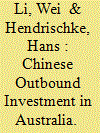

|
|
|
|
|
| Summary/Abstract |
This article contributes to our understanding of Chinese corporate expansion into developed economies by using Australia as a case study of how, in the 2010s, Chinese firms began transiting from government-driven resource investment to entrepreneurial expansion in new industries and markets. We contextualize this process by demonstrating how changing market demand and institutional evolutions at home and in the host country created new motivations for Chinese investors. In particular, the decline of active government control in China over the overseas operations of Chinese firms and the more business-oriented regulatory regime in Australia empowered local subsidiaries of Chinese firms to become more entrepreneurial and explorative in their attempts to compensate for their lack of competitiveness and weak organizational capabilities. Consequently, Chinese firms brought their domestic experience and modus operandi to the Australian host market and collectively adapted and deployed dynamic capabilities such as the use of network linkages, experiential learning and corporate reconfiguration. We find that this transfer of capabilities was facilitated by the co-evolution of the Chinese and Australian institutional and market environments and has maintained Australia's position as one of the major recipient countries of Chinese outbound investment, opening the Australian economy to ongoing expansion and disruption.
|
|
|
|
|
|
|
|
|
|
|
|
|
|
|
|
| 8 |
ID:
170093
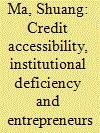

|
|
|
|
|
| Summary/Abstract |
Using a brand new data, we document seriously low credit accessibility from financial institutes for small and micro enterprises (SMEs) and examine whether and how it affects entrepreneurial activity in China. We find that credit constraints significantly decrease the possibility of households becoming entrepreneurs. Based on our estimates, 10% decrease in the probability of being credit constrained would be associated with 4.3 million newly-created household businesses, or equivalently 11 million jobs. In the end, factors that determine credit accessibility are exploited and the result indicates that institutional deficiency plays a role in shaping the pattern of financing difficulties in China. Specifically, we find households in regions with more commercialized banking or those with government-sector workers are more likely to access to credit when other relevant variables are conditioned. In particular, the positive role of government-sector workers is more pronounced in regions with weaker market institutions.
|
|
|
|
|
|
|
|
|
|
|
|
|
|
|
|
| 9 |
ID:
173120


|
|
|
|
|
| Summary/Abstract |
Our research, based on a sample of 500 veterans currently studying at Israeli colleges and universities, suggests that certain aspects of military service are associated with greater entrepreneurial intentions. Specifically, the desire to engage in entrepreneurship is higher among veterans with command experience than veterans without. Similarly, veterans of technological units generally express greater entrepreneurial interest than veterans of combat units. A comparison of commissioned and noncommissioned officers yields curious results and offers a possible direction for further investigation. Although Israel is among the few countries that maintains a mandatory draft, the general applicability of these findings to countries with volunteer forces is discussed.
|
|
|
|
|
|
|
|
|
|
|
|
|
|
|
|
| 10 |
ID:
180633
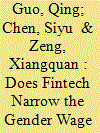

|
|
|
|
|
| Summary/Abstract |
Information and communication technology promotes the rapid development of fintech, which has a far-reaching impact on wage distribution in China. Using data from the Chinese General Social Survey and the Index of Digital Financial Inclusion, this study examines the impact of fintech on the gender wage gap. We find that fintech (i) narrows the gender wage gap; (ii) reduces capital constraints and operating costs, thereby promoting female entrepreneurship, driving more women into employment, and enabling women to increase their wages and bargaining power within the household; and (iii) positively impacts the wages of women (and men) who have lower family economic status, and helps women (but not men) counter the risk of decline in wages caused by childbearing and caring under the two-child policy. These findings have important policy implications and provide evidence of women's improving economic conditions leading to a reduced gender wage gap.
|
|
|
|
|
|
|
|
|
|
|
|
|
|
|
|
| 11 |
ID:
187918
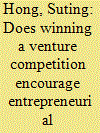

|
|
|
|
|
| Summary/Abstract |
This paper examines whether winning venture competition spurs entrepreneurs to carry out entrepreneurial exploration. We use data from new venture competitions organized by Shanghai municipal government that are open to innovative small ventures. Using a regression discontinuity design, we show that winning leads to a higher level of entrepreneurial explorations in the year following the competition. However, this effect is reduced for female entrepreneurs, and entrepreneurs whose affiliated ventures have a shorter time of operation. Our findings are consistent with existing theories about entrepreneurship and behavioral economics, including entrepreneurial experimentation and “house money” effect.
|
|
|
|
|
|
|
|
|
|
|
|
|
|
|
|
| 12 |
ID:
187883


|
|
|
|
|
| Summary/Abstract |
This paper studies the effect of urban cultural diversity on the entrepreneurship activities of rural-to-urban migrants in China. Merging nationwide data from two different sources, we construct the city index of cultural diversity and explain the entrepreneurial behavior of migrant workers from the perspective of culture. We find robust evidence that urban cultural diversity significantly increases the probability of rural-to-urban migrant workers undertaking entrepreneurial activities, and the effect is larger for necessity entrepreneurship. Compared with intraprovincial migrant workers, urban cultural diversity has a greater effect on interprovincial migrant workers. We also find that the effect of urban cultural diversity on migrant workers who work in the eastern region and highly developed cities is significantly larger. The mechanism analysis suggests that innovation resource accessibility and social inclusion explain the increase in the entrepreneurship engagement of migrant workers produced by urban cultural diversity.
|
|
|
|
|
|
|
|
|
|
|
|
|
|
|
|
| 13 |
ID:
137704


|
|
|
|
|
| Summary/Abstract |
Within the context of a tri-variate vector autoregressive framework that includes entrepreneurship, this paper examines the link between electricity consumption and industrial production in Singapore's manufacturing sector. Unlike the existing studies, this paper focuses on one sector of the economy and utilises a unique monthly dataset. Empirical analysis based on Johansen's cointegration approach shows that the three variables are cointegrated – i.e., a stable long-run relationship exists among electricity consumption, output and entrepreneurship in Singapore's manufacturing sector. Empirical analysis based on data from January 1983 to February 2014 reveals that electricity consumption adjusts very slowly to shocks to industrial production and entrepreneurship. Furthermore, entrepreneurship Granger causes electricity consumption, which causes industrial production. As electricity consumption causes industrial output, the growth hypothesis concerning energy consumption and economic growth holds in Singapore's manufacturing sector and policies that restrict electricity production, without electricity imports, are likely to lead to a decline in the manufacturing output.
|
|
|
|
|
|
|
|
|
|
|
|
|
|
|
|
| 14 |
ID:
064620
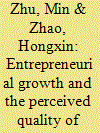

|
|
|
|
|
| Publication |
Jul-Aug 2005.
|
|
|
|
|
|
|
|
|
|
|
|
|
|
|
|
| 15 |
ID:
143315


|
|
|
|
|
| Summary/Abstract |
Sociocultural factors in relation to the concept of entrepreneurship have been neglected in theories of economic development. While the growth of entrepreneurship often involves social and cultural issues, mainstream economists seem averse to discuss this. The present article emphasises the need for interdisciplinary enquiry to better understand various kinds of South Asian entrepreneurial activity and success from ethnographic and psycho-sociocultural perspectives. Existing research confirms that several non-economic factors can be identified as highly relevant for entrepreneurship and economic success. The article analyses those findings, places them in a wider context and calls for further research.
|
|
|
|
|
|
|
|
|
|
|
|
|
|
|
|
| 16 |
ID:
116516


|
|
|
|
|
| Publication |
2012.
|
| Summary/Abstract |
This paper examines the impact of entrepreneurship on economic growth by using a panel data set of 29 provinces in China over 20 years. Two indicators of entrepreneurship are defined and introduced into the traditional growth regression framework that is estimated using the system generalized method of moments. We also use the ratio of staff and workers of state-owned enterprises and per capita sown land area as the instrumental variables to identify the causal effect of entrepreneurship on economic growth. Our results suggest that entrepreneurship has a significant positive effect on economic growth and this finding is robust even after we control for other demographic and institutional variables. Our study provides some evidence that may be used as a basis for evaluating the effect of China's policy on private business which has been increasingly relaxed since the late 1970s.
|
|
|
|
|
|
|
|
|
|
|
|
|
|
|
|
| 17 |
ID:
082443


|
|
|
|
|
| Publication |
2008.
|
| Summary/Abstract |
In this article, the author examines the connection between Yi (Nuosu) entrepreneurship and ethnic identity. First the term identity is discussed, and then important factors for creating identity among Nuosu entrepreneurs are outlined. Concerning the Nuosu-Yi, until today the clan plays a predominant role. Through entrepreneurship, clan-transcending institutions and a clan-transcending ethnic identity are emerging. The author follows up by addressing identity issues in terms of the rewritten official Chinese history on the Yi. To understand the entrepreneurs' concept of identity, it is necessary to understand that their discourse on questions of status and identity very often coincide with arguments advanced by Yi scholars. Nuosu entrepreneurs, as a new economic and social elite, thereby contribute to the shaping of a new Nuosu collective consciousness. Time (history) and space (Liangshan) are crucial markers of Nuosu identity, but the author argues that economic success is an additional factor for developing a new identity as well. Notably, entrepreneurs are both carriers of ethnic symbols and agents of modernization who actively shape identity.
|
|
|
|
|
|
|
|
|
|
|
|
|
|
|
|
| 18 |
ID:
119948


|
|
|
| 19 |
ID:
120119


|
|
|
|
|
| Publication |
2013.
|
| Summary/Abstract |
This article uses two unique panel data sets to study the causal effect that armed conflict has over firm exit in Colombia. Using a fixed-effect estimation methodology at the plant level and controlling for the possible endogeneity of armed conflict through the use of instrumental variables, we find that a one-standard deviation (SD) increase in the number of guerrilla and paramilitary attacks in a municipality increases the probability of plant exit in 5.5 percentage points or .28 SD. This effect is stronger for younger manufacturing plants, with a smaller number of workers and low levels of capital.
|
|
|
|
|
|
|
|
|
|
|
|
|
|
|
|
| 20 |
ID:
155719
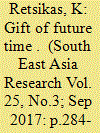

|
|
|
|
|
| Summary/Abstract |
The attainment of religiously informed and socially responsible wealth is a desire widespread in the metropolises of Java, Indonesia, especially amongst the pious middle classes. This article aims at an understanding of the emergence and effects of an early 21st century desire for pious entrepreneurial success, by focusing on the practices people consistently and regularly undertake in order to actualise this. It claims that the religiously informed desire for entrepreneurial success is permeated by a mode of temporality that privileges the future at the expense of the past and the present. This temporal orientation has important consequences for subject-making, as it forces the subjectivities created to take a distinctively asymptotic form, resulting in the production of self-differing subjects; that is, subjects in which past, present and future actualisations lack coincidence and complete convergence.
|
|
|
|
|
|
|
|
|
|
|
|
|
|
|
|
|
|
|
|
|